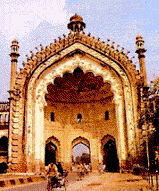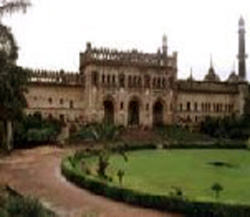|
Travelogues Lucknow: Colonial Past
|
|||||||||||
My early memories of Lucknow date back to childhood when winter vacations were spent with my grandparents there. I remember the beautiful grand building of the railway station and the tongas or horse-drawn carriages that ferried us around town. Hazratganj was a wide empty road then. I recall the roaring lions at the zoo and the ubiquitous monkeys particularly visible on the old Monkey Bridge over the Gomti river.
The Bhulbhulaiya was an impossible maze of intrigue in childhood. We looked forward to watching films at Mayfair, and having tea at Kwalitys next door. The dominance of a traditional, mellifluous, Muslim culture had outlived Lucknow's colonial past. I know my grandmother thought it was the best place to live, and she had seen life in enough cities.
|
More on U.P. • Allahabad Travelogues • Kumaon Remembered • Discovering Auli Impressions • Agra • Delhi | ||||||||||
And here, history is not contained in the dusty pages of antediluvian libraries alone, nor merely in the ruins of historical buildings. It lives and breathes everywhere. The call of the muezzin resounds among the domes, turrets and minarets, and remains a prayer of the soul. The believer and the hopeful of every faith come to have their prayers heard, to have their dreams fulfilled at the several mazaars in the city. Among them is that of the unknown Kasim Baba at the Residency. The mazaar of the Sufi saint Hazrat Maulana Shah Pir Mohammad, who lived 350 years ago draws crowds to Laxman Tila. Hazrat Shahmina Wali Baba Chishti, born some 550 years ago, is still revered at his mazaar, adjoining the K.G. Medical College.
And yet, time has not stood still on the banks of the river Gomti, where the township of Lucknow grew. Lucknow, the capital city of the state, is easily the most advanced and cosmopolitan of cities in Uttar Pradesh. Perhaps only in contrast with the rest of the state that is steeped in conservatism. Where little has changed with the ticking of the clock. Where a strange sense of ennui has held the state paralysed in a time capsule.
|
|||||||||||
Editor: Romola Butalia (c) India Travelogue. All rights reserved. |
|||||||||||

 I know Lucknow well. I lived there in two separate stints of about two years each. I have seen the city expand, the colonies grow, and I have seen and understood the socio-political ethos of the heartland of India. Nowhere is Hindi spoken more beautifully, nowhere are the strains of Urdu more musical to the ears, nowhere is the old-world charm of courtesy more honoured. The kakori kababs prepared by the best chefs in five star hotels don't quite melt in your mouth as in Awadh, where the nawabs may have long gone, their traditions diluted, but something of them still lives in the shadows of the history of Lucknow.
I know Lucknow well. I lived there in two separate stints of about two years each. I have seen the city expand, the colonies grow, and I have seen and understood the socio-political ethos of the heartland of India. Nowhere is Hindi spoken more beautifully, nowhere are the strains of Urdu more musical to the ears, nowhere is the old-world charm of courtesy more honoured. The kakori kababs prepared by the best chefs in five star hotels don't quite melt in your mouth as in Awadh, where the nawabs may have long gone, their traditions diluted, but something of them still lives in the shadows of the history of Lucknow.
 The beautiful and stately Nur Baksh Kothi is where successive district magistrates have worked and lived. In the office here, preceeding the name of the D.M.'s who have lived here, is a short history of the house, which ends : "There are two graves of unknown persons in a corner room in the east, and the place is reputed to be haunted."
The beautiful and stately Nur Baksh Kothi is where successive district magistrates have worked and lived. In the office here, preceeding the name of the D.M.'s who have lived here, is a short history of the house, which ends : "There are two graves of unknown persons in a corner room in the east, and the place is reputed to be haunted."